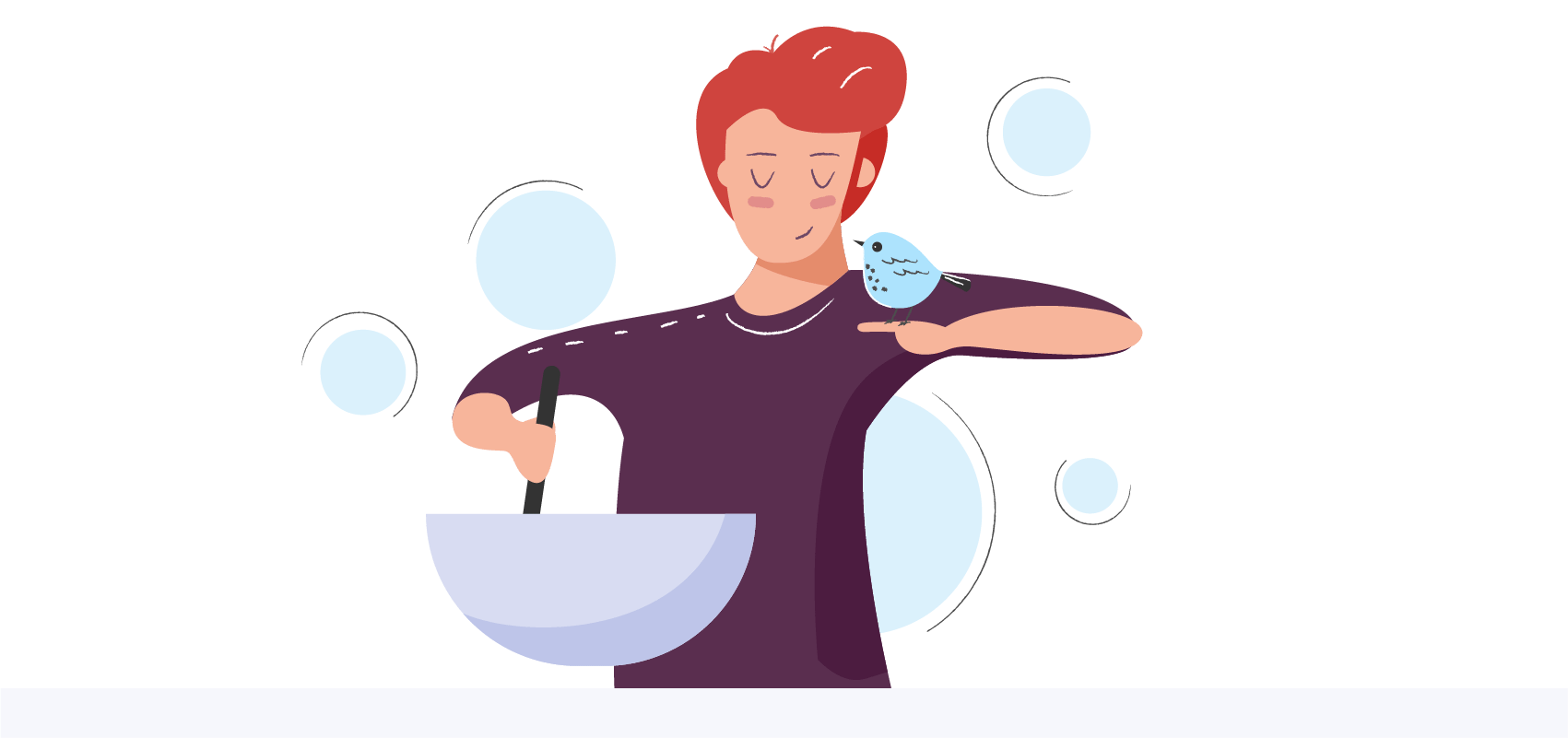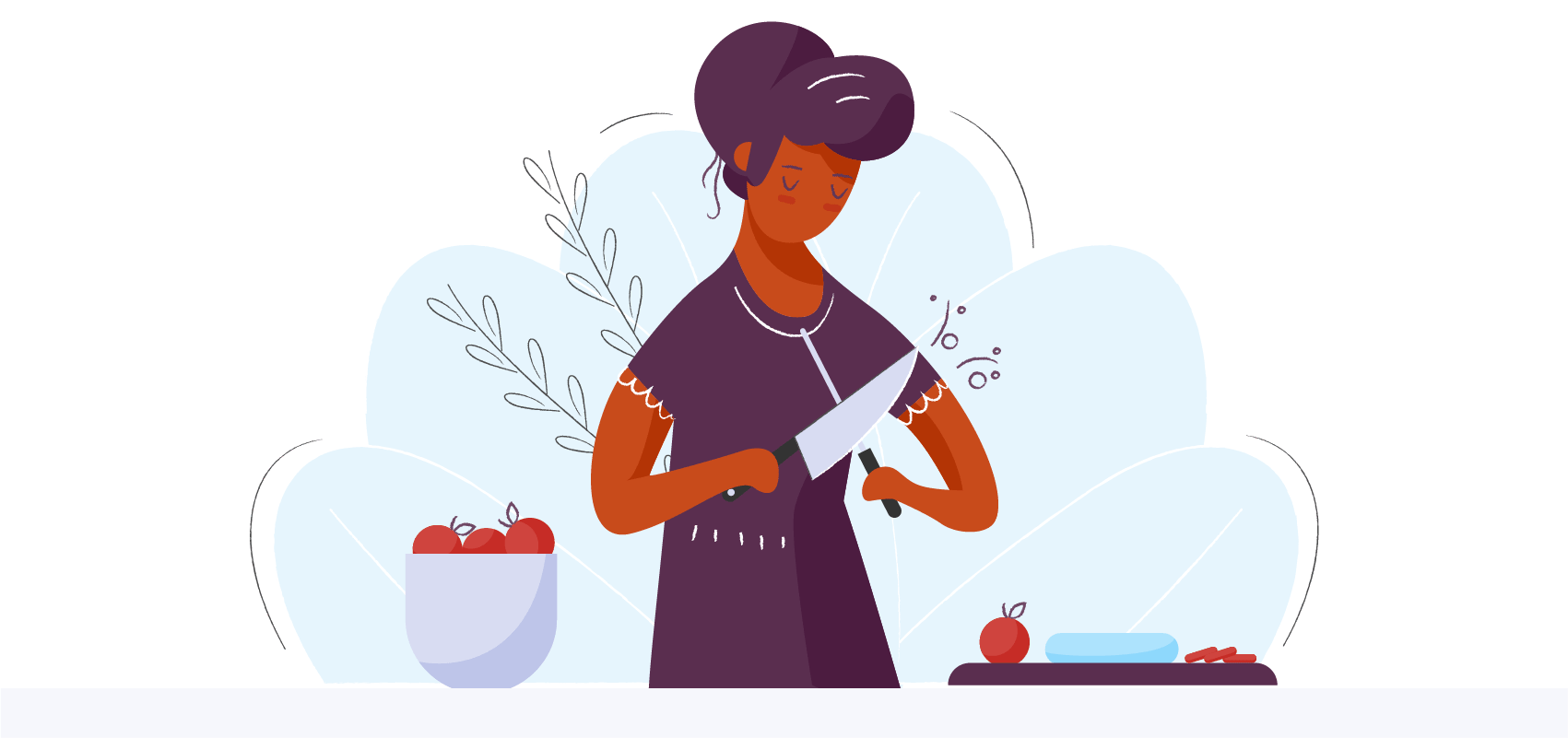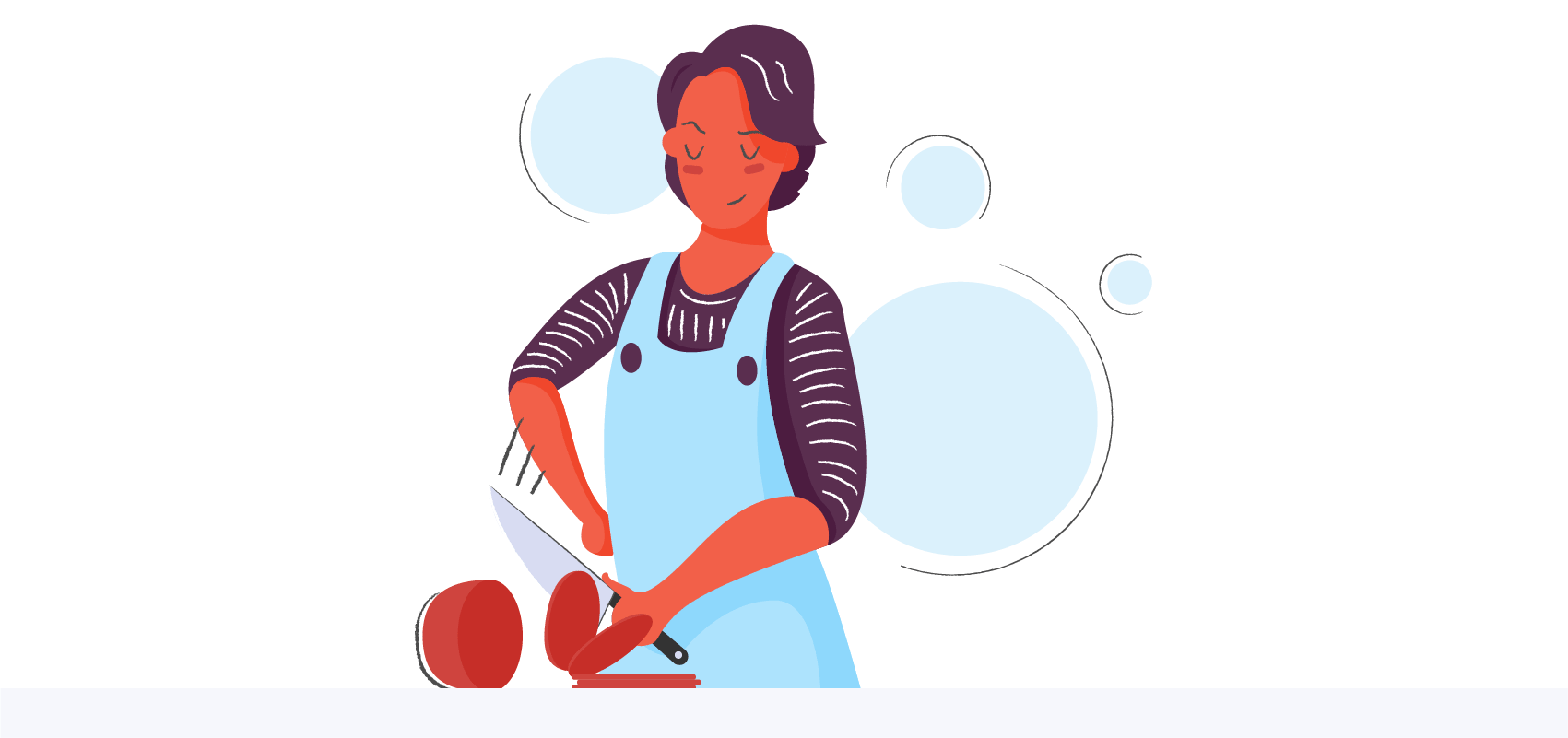
Sizzling butter, steaming water, cracking pepper — all calming sounds of the kitchen… but do you notice them? Some of the most peaceful times of the day can be those that are culinary. Rarely, though, do people take the time to enjoy this experience. Eating that summer strawberry salad, a piquant blend of sweet and refreshing is fun, but what about the process to actually cook it?
Cooking as Therapy
Scientifically proven and zen chef approved, approaching mindfulness via cooking is a new trend stirring up buzz in the therapy industry for the certified solace it exudes. Think about it — when cheffing up any sort of dish, we’re creating nourishment for ourselves and ensuring our brain and body that energy is on the way. Focus, mindfulness and deliberacy during the process lulls and soothes our busy minds. Here are 8 reasons why:
1. Increased Sense of Calm

University of Chicago professor Dr. Mihaly Csikszentmihalyi, who after studying subjects for 20 years, found that because cooking food is a basic human trait, our ability to think and calmly contemplate is sharepend. He also found that cooking is the seventh most enjoyable part of someone’s day — relished only less than activities like love-making and the act of eating.
A dog-eat-dog world it may be outside, but while you’re cooking at home only calm, constructive thoughts flow. No arguments to win, no fights to have, simply put, there’s no beef. We are calmer in the cookhouse. Take a deep breath and enjoy the culinary process by turning off the TV and whipping up a tasty morsel.
2. Mimics Meditation

Challenging is good, getting fed up is not. Cooking provides a healthy balance. Julia Ohana, master social worker and culinary therapist, explains that the combo of engaging our brain and providing nourishment for ourselves and others leads to psychological benefits.
Getting pleasantly immersed in a challenge that will yield basic, pleasurable results (e.g. food), our bodies are calmly lulled into a meditative state when we mindfully cook — quite literally, we get lost in the sauce.
No, you’re not going to experience these feelings while throwing a Kid Cuisine into the microwave. Instead, truly think about what adds to the dish at hand when you make a meal from scratch. Maybe grabbing some tumeric from the drawer above will add the perfect amount of tang, or dashing some lemon juice from the fridge will spritz up your meal. Anything is a go-to ingredient, just customize thoughtfully and methodically.
3. Makes You Smile More

Creativity at night has been proven to make your smile wider the next day. In a study published by Positive Psychology, researchers found that those who deliberately participate in a creative activity like cooking the night before a shift were more enthusiastic than those who did not. In essence, you're keeping your brain oiled and fine tuned even during time off.
While we may be inclined to recline in front of the TV, take the time to prepare some food, so your brain stays fresh and inventive. After a day at work brains fry, it’s just how it is. But as exercise is to nurturing muscles after sitting for eight hours, creative brain stimulation is to boosting positivity after staring at Excel all day.
4. Provides a Low-Stress Environment

In the same way that going for a walk or stretching releases body tension, taking a few deep breaths and calmly making a meal eases your body and loosens areas tightened by stress.
Research regarding the effects of cooking released by the British Journal of Occupational Therapy showed that those observed in the study all mentioned the welcoming environment of a kitchen. Cooking, to them, was an activity free of pressure and in turn, it heightened their mood. Serotonin is to blame, as it makes one feel more relaxed, at ease and free of all underlying simmering.
Letting you truly unwind is conscientious cooking; as it’s free of all deadlines and no career-dependent expectations. So, you can actually enjoy it. Yes there may be little ones wishing it were pizza and not stuffed bell peppers on the table, but the process is what’s important—and we both know they love the food, whatever it is, deep down.
5. Sharpens New Skills

Not good at cooking? Good. The endeavor provides a task for our brains to think critically about and forces us to analyze an objective at hand. In the same British Journal study, participants, when free from pressure, were able to think critically and truly focus on their cooking. By thoughtfully going through a recipe and spicing it up with creative customization, neurons that are used for calming activities engage and put us at ease. We are learning, and enjoying it.
Growing jaded is a natural process every human goes through — it’s integral to our experience on earth. However, so is keeping our brains fresh. Take advantage of not being a Top Chef; it’s surprising what our brains can brew when we try a new staple food dish. From highchair to barstool, the kitchen is a place to keep minds active and attentive.
6. Bolsters Confidence

Inevitable is the fact: while cooking, we may fail. Cookies get burnt, rice gets mushy, steak gets charred and that’s the beauty of it. Through trial and error, we’re orchestrating recipes that may be housed in our family’s cabinets for generations to come.
Our aptitude for a positive attitude is strengthened as well, say researchers Dr. Elizabeth Anne McKay and CertEd Lesley Hayley. Cooking is a productive activity, which leaves us feeling accomplished upon completion, the experimenters say.
Building tenacity is a difficult process. Typically, the only time we’re exposed to tenacity-boosting stimuli is through high-pressure, high-reward situations. So instead, build backbone by cooking where the stakes are lowered. Try out a new recipe and ask for feedback, then reiterate and serve up another dish.
7. Develops Focus

Losing oneself in the TV after a long, stressful day at work is sublime—we get it. But, instead, try what you see. Mindful cooking provides us with a tangible and worthwhile way of filling time, which both researchers above say, focuses the brain and increases the ability execute to tasks outside of the kitchen, too.
Again touching on ideas of healthy mental stimulation, the brain thrives when it’s engaged and producing a product for consumption. In essence, we’re practicing for jobs on our plate in “the real world.”
Relaxation and accomplishment may seem like mixing cooking oil and water, but when preparing a meal they coincide. Take pride in what you set on the table and try putting 100 percent into the preparation of a new dish, you’ll be making your taste buds and future self happy.
8. Strengthens Your Senses

Essential to the process of mindful cooking is feeling each ingredient, smelling each spice and hearing every simmer. Vice News shines light on the idea that by being deliberate about where our focus is directed helps hone senses and plays with the idea of working smarter, not harder.
Like most meditative process, cooking helps drown out “white noise” and forces a spotlight to shine on what’s vital at a given moment. Take note of how everything feels and picture what it will taste like in a dish. Dramatic? Maybe. Hones your senses? Definitely.
Culinary pursuits take time and adding a zenful mindset to them will only add to the challenge. However, determination and dedication to a healthier form of cooking will yield a new meditative mindset.
Of course every kitchen doesn’t need to turn into a yoga studio, but with design additions like RTA cabinets a calming atmosphere is created. Where there’s a meal being made, there’s relaxation to be had. Professional or casual, try it out next time you decide to whip up a dish—that goes for you too, Gordon Ramsey.
Sources: Huffington Post | New York Times | Vice | British Journal of Occupational Therapy | Journal of Positive Psychology





















